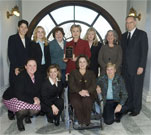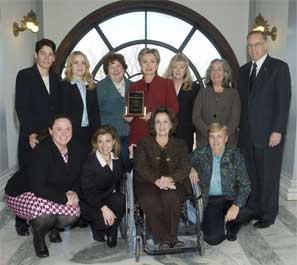Lifespan Respite Care Act Summary
January 23, 2007

|
 |
| National Respite Coalition Representatives, including AUCD's Kim Musheno, present Sen. Clinton with an award for her leadership in passage of the Lifespan Respite Care Act. January 23, 2007 |
The Lifespan Respite Care Act authorizes $289 million over five years for state grants to develop Lifespan Respite Programs to help families access quality, affordable respite care.
Use of Funds
- Development of lifespan respite programs at the state and local levels
- Evaluation of such programs
- Planned or emergency respite services;
- Training and recruitment of respite workers and volunteers
- Caregiver training to help make informed decisions about respite services
What is a Lifespan Respite Program?
Lifespan respite programs provide coordinated systems of accessible, community-based respite care services for family caregivers of children and adults with special needs.
Who Can Access Lifespan Respite Programs?
Caregivers who are family members (including grandparents caring for grandchildren), foster parents, or other adults providing ongoing unpaid care for an adult or child with a special need may access these programs. "Adult with a special need" is defined broadly as a person 18 years of age or older who requires care or supervision to meet the person's basic needs or prevent physical self-injury or injury to others. A "child with a special need" is a person less than 18 years of age who requires care or supervision beyond that required of children generally to meet the child's basic needs or prevent physical self-injury or injury to others.
Lead Agency Eligibility
Funds are provided on a competitive grant basis to state agencies, other public or private nonprofit entities capable of operating on a statewide basis, a political subdivision of a state that has a population greater than 3 million, or any already recognized State respite coordinating body. Priority would be given to applicants who show the greatest likelihood of implementing or enhancing lifespan respite care statewide.
Federal Administration
The Secretary of Health and Human Services is required to work in cooperation with the Maternal and Child Health Bureau, Health Resources and Services Administration; the National Family Caregiver Support Program, Administration on Aging; the Administration for Children, Youth and Families; the Administration on Developmental Disabilities; and the Substance Abuse and Mental Health Services Administration to ensure coordination of respite for family caregivers.
National Resource Center
Under separate authority, the Act also establishes a National Resource Center on Lifespan Respite Care.







